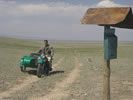Eye For Film >> Movies >> Wild Field (2008) Film Review
This film from director Mikhail Kalatozishvili, grandson of Mikhail Kalatozov – the only Russian director ever to win the Palme d’Or at Cannes (for The Cranes Are Flying), is a story of isolation, both of a community and an individual. Full of beautifully remote and desolate vistas from cinematographer Peter Dukhovsky, Wild Field tells the story of a skilful young doctor, Dmitry Vasillevich (Oleg Dolin) who is posted to an isolated and lawless rural community on the Kazakh steppe, far from his fiancée and his previous life. In addition to the life of the doctor, the story also encompasses a wide variety of secondary characters drawn from across this barren landscape, including a militiaman and his nephew, a number of farmers and peasants, an attractive young girl, Dmitry’s fiancée, and the mysterious stranger who Dmitry refers to as his ‘guardian angel’.
Set against a backdrop of violent skirmishes, desertion of other representatives of civilisation, and a pervading pessimism and sense of disintegration and decline, it is very hard to see what motivates Dmitry to remain in this ‘wild field’. I found it extremely frustrating that he was given no back-story and that he had no convincing reason to remain there, especially given that he was clearly missing his fiancée.

Likewise, there was no real depth to any of the minor characters and it is hard to care what happens to them as they feel so underdeveloped. There is a strong impression that the expansive cast of characters was meant to provide a doppelganger effect, hinting at parallels between the lives of the secondary characters and that of the hero, but here again the lack of character development is the director’s weakness. In a 700-page Tolstoyan epic these minor characters might have elicited any variety of emotional response, but here they provoke only apathy and indifference.
In a sense Dmitry represents civilisation, scientific advancement and progress for a community in decline – the sole representative of the outside world prepared to remain in this lawless, remote outpost. In an otherwise backwards and anachronistic society he must battle against rural ignorance and superstition in order to promote understanding and scientific enlightenment… or so you would imagine. However, this is undermined in ridiculous fashion by bizarre occurrences within the film – particularly a sequence in which a man who has been killed by a lightning bolt is brought back to life by the villagers’ superstitions. Instead of the doctor disproving superstition, it is he whose beliefs are disproved – a bizarre twist which seems to seriously destabilize the purpose of the central character.
The film is also let down badly by some appalling translation, which renders the subtitling at best amusingly poor, at worst totally indecipherable. It really does feel as though someone has taken the Russian script and put it wholesale through an internet translation programme. The irony is, of course, that the film’s scriptwriters were posthumously awarded ‘Best Screenplay’ at the Kinotavr 2008 festival – what a shame that English-speaking audiences won’t be able to appreciate this!
With a large cast of minor characters drawn from across the spectrum of the isolated Kazakh steppe, this film seems to want to return to the scope of the great Russian novelists of the 19th and 20th centuries, but fails miserably in this ambition. There are things to enjoy here, not least the sensitive portrayal of the doctor by Oleg Dolin and the impressive cinematography by Peter Dukhovsky, which conveys a sense of the infinite wilderness of the Kazakh steppe, but ultimately this is not a particularly rewarding experience and I wouldn’t recommend it as a showcase for Russian cinema.
Reviewed on: 12 Sep 2008
















